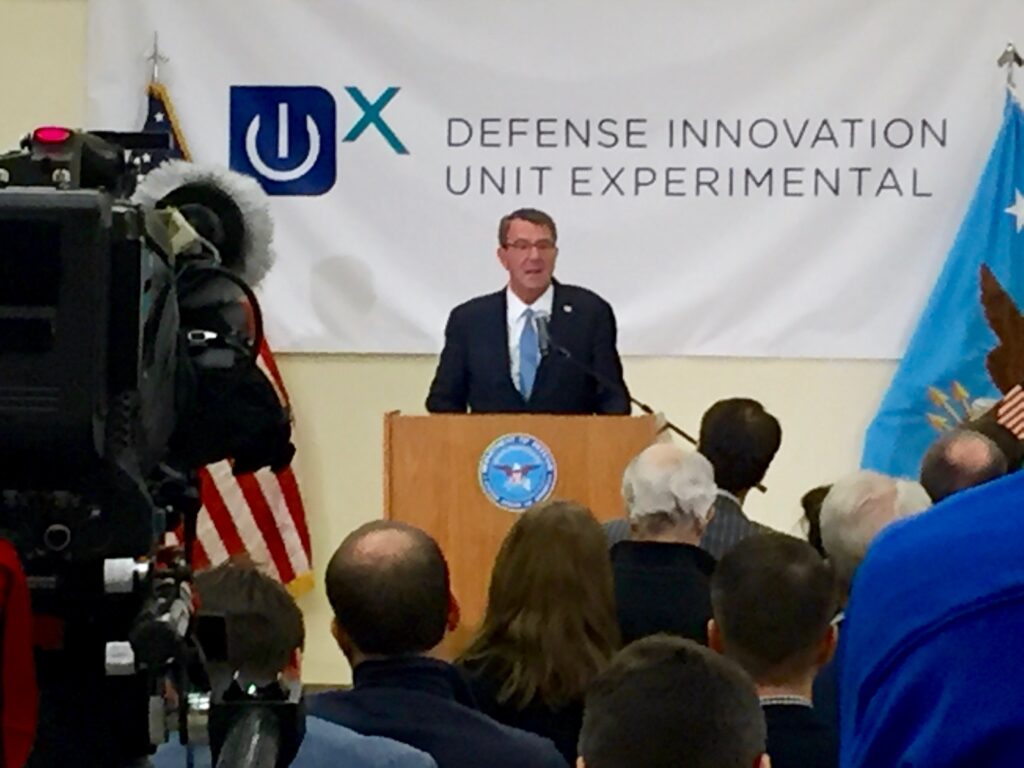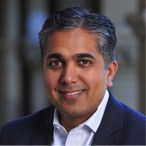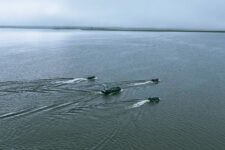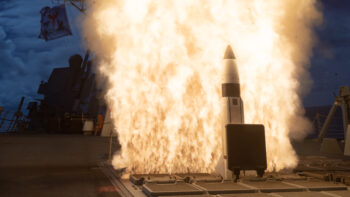
SILICON VALLEY: Defense Secretary Ash Carter changed the leadership today of his flagship office trying to improve relations with entrepreneurs and major companies here. At the same time, Carter reorganized the Defense Innovation Unit (Experimental) — DIU(X) — to link it directly to his office, largely bypassing the traditional Pentagon acquisition system.
In a prepared statement ahead of his speech, Carter said the new leadership would “move at the speed of business – we know how fast companies run here, and in other tech hubs around the country, and we expect DIUx 2.0 to run alongside them.”

Raj Shah
UPDATE BEGINS: Carter announced the new leadership of DIUX
Instead of a single director as DIU(X) had before, a team of four will form what Carter called “a partnership-style leadership structure” inspired by Silicon Valley, with a “managing partner” as first among equals:
- Raj Shah, an Air National Guard F-16 pilot with a Wharton MBA, is DIUX’s new Managing Partner. He was most recent senior director of Strategy at Palo Alto Networks, with a resume ranging from a cybersecurity firm to McKinsey & Co. to the Office of the Secretary of Defense.
- Isaac Taylor joins DIUx from Google, where he was head of operations for Google X, the company’s R&D facility. There, he’s worked on Google Glass, on Google’s self- driving cars, on virtual reality technologies, and many other Google programs.
- Vishaal Hariprasad, an Air Force Reserve captain, combat veteran, and Bronze Star recipient, who co-founded a successful cybersecurity start-up and served as head of threat intelligence at a large public company.
- Chris Kirchhoff was a civilian advisor to the Chairman of the Joint Chiefs, a lead author of the White House’s Big Data Report, and director of strategic planning at the National Security Council.
“I’m establishing a partnership-style leadership structure for DIUx,” said Carter, “making the leadership structure of DIUx as flat as any start-up here in the Valley.”
And Carter has taken a move long pushed by cyber warfare experts: he’s bringing in the Reserves. They’ll be led by Navy Reserve Commander Doug Beck – a decorated combat veteran who served in Iraq and Afghanistan. Beck has impressive Silicon Valley credentials. He is Apple’s Vice President for the Americas and Northeast Asia, reporting directly to CEO Tim Cook. UPDATE ENDS
Senior defense officials briefed reporters accompanying Carter last night about the changes but withheld the names of the new leaders of the Defense Innovation Unit Experimental (DiuX). Also, Carter will announce its expansion to Boston, which I have heard means the Massachusetts Institute of Technology. (We’ll see.) The initial facility was based at Moffatt Field, next to a facility owned by Google, where we landed today.

Former DIUx director George Duchak
The senior officials said the new DIUX leaders would boast experience both in the technology industry and in the Pentagon, clearly implying the veteran bureaucrat and the highly decorated SEAL who led the office created by Carter didn’t really understand the secret sauce required for working with the entrepreneurs and huge tech companies who power this industry. The suitability of DIUX Director George Duchak and Rear Adm. Brian Hendrickson had been questioned by close observers of Silicon Valley ever since their appointment. That said, Carter did make sure to thank Duchak for founding the organization and added that “we look forward to his continued service at the Pentagon.”
When Carter paid his first visit here in August last year, I spoke with David Slayton, a research fellow at Stanford University’s Hoover Institution about the DIUX’s leadership. Here’s what he said:
“You don’t just parachute in with a flag officer, staff and set yourself up in a SCIF (Sensitive Compartmented Information Facility) and start to operate in the valley.” Slayton says the military’s approach has been “too traditional.”
While I didn’t know who the Pentagon has named to lead the DIUX until Carter’s speech, Slayton is one of those few people to boast warfighting experience, knowledge of Silicon Valley and a relationship with Carter. The secretary also named Eric Schmidt, executive chairman of Google parent company Alphabet, to lead a new Defense Innovation Advisory Board in March. If he were named to lead the DIUX that would certainly answer the criticism that its past leaders didn’t know the industry and its peculiar culture well enough.
Two experts at the Center for a New American Security (CNAS) praised Carter’s actions in appointing new leadership at DiuX. “By taking early, corrective action and demonstrating how the DoD can learn from such a pilot, Carter is sending a strong message to the DoD by using his own initiatives as an example for others,” Ben FitzGerald and Loren DeJonge Schulman wrote. “Despite these changes, the DIUx should not be viewed as a failure, and this announcement should not be interpreted as a wavering of the secretary’s commitment to innovation or external outreach. In fact, it should be seen as doubling down on this commitment in an unprecedented way.”
Regardless of how appropriate the initial choice of leadership was, the senior defense officials said that the DIUX had engaged with 500 entrepreneurs and helped execute 20 acquisitions of technology with “non-traditional companies.”
One of the senior defense officials who briefed the four reporters traveling with the secretary admitted not all had been peaches and cream at the DIUX. “I don’t want to leave you with the impression this been easy or that it has all worked. There have been bumps.” But Carter had broken an impasse with the technology industry, this official said, noting he was the first Defense Secretary to visit here in 20 years. To encourage further close ties between the two groups, the DIUX will report directly to Carter. “One of the structural changes we are making is, it will still have close ties to AT&L, but it will report directly to the secretary,” the senior defense official said.
The DIUX is seen as especially crucial to the Pentagon’s Third Offset Strategy, meant to fund and develop new technologies that will keep the US ahead of our Russian and Chinese competitors. (Deputy Secretary Bob Work is particularly keen on the Google Car and other work in artificial intelligence).
To boost that, Carter said the $30 million in new funding requested for DIUX “may just be a starting point” since he expects the four services may add to it. And to channel these resources into systems that will give our future warfighters a battlefield advantage,” Carter said, “DIUx will exercise all avenues to fund promising technologies, including merit-based prize competitions, incubator partnerships, and targeted R&D efforts.”

Little Impact So Far
Asked about DIU(X)’s impact during an AFCEA panel in Washington this morning, the deputy Chief Information Officers of all five armed services damned it with faint praise. That’s telling: If DIU(X) isn’t helping the CIOs, who work in the same fast-moving area — information technology — as does Silicon Valley and who urgently need help keeping up, then who is it for?
The Air Force is “leveraging” DIU(X) and “we actually have a pretty heavy presence” there, said Air Force CIO Bill Marion in the most enthusiastic statement. But he didn’t specify anything DIU(X) has actually done.
“We’re seeing some value from it but we haven’t seen the full range,” added Navy DCIO Janice Haith.
“The potential is there,” said Army Deputy CIO/G6 Gary Wang. He recommended that the DIU(X)’s best value would be to organize technology “petting zoos” and contests to give Defense Department officials first-hand experience with Silicon Valley and its inventions. (He’s well aligned with Sec. Carter’s call for “merit-based prize competitions,” historically a DARPA speciality).
DIU(X) is too new to expect much impact, agreed the Coast Guard and Marine Corps CIOs. Any judgment, said Brig. Gen. Dennis Crall, would be “premature.”
And now DIU(X) is effectively starting over.
Major trends and takeaways from the Defense Department’s Unfunded Priority Lists
Mark Cancian and Chris Park of CSIS break down what is in this year’s unfunded priority lists and what they say about the state of the US military.


























